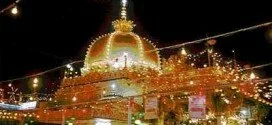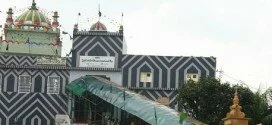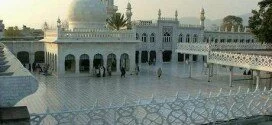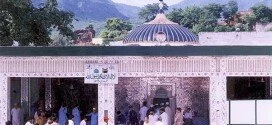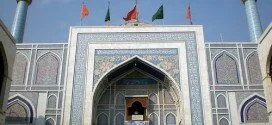
Description:
Qudrat Ullah Shahab (or Qudratullah Shahab; 1917 – July 24 1986) was an eminent Urdu writer and civil servant from Pakistan.
His Life:
Qudrat Ullah Shahab was a well known bureaucrat of Pakistan. He was from Jammu Kashmir and initially got into civil service by passing the Indian civil service exam some years prior to the Indo Pak partition. He served on several high offices including being Ambassador of Pakistan to Netherlands. He got well known to people after his book Shahab Nama got published, which portraits his all life and experiences.
His initial days of life beginning with childhood were full of adventures, some of which he had mentioned in his book Shahab Nama. The book has become a cult favourite in Paksitan.
His personality reflected mysticism, which he got as a golden gift during his life, through an out-of-world personality which he named as ‘Ninety’ within his book SHAHAB NAMA, this mysticism belongs to Owaisiah chain of Sufism.
 …’Alakh Nagri’ is the autobiography of Mumtaz Mufti describing the second phase of his life. This book has also unveiled the mystical life of Qudrat Ullah Shahab…
…’Alakh Nagri’ is the autobiography of Mumtaz Mufti describing the second phase of his life. This book has also unveiled the mystical life of Qudrat Ullah Shahab…
Mumtaz Mufti and Ashfaq Ahmed both well known writers of Pakistan were close friends of Q.U.Shahab and were deeply inspired by him.
After his death in 1986, Q.U.Shahab is resting in a grave in Islamabad Graveyard
Early years:
He was born in Gilgit, in an Arain family where his father Abdullah Sahib was Governor during Dogra rule. Most of his schooling was in Kashmir, and there he excelled both in Urdu and English languages. Without telling anyone he wrote an essay and won the world competition by Reader’s Digest, a rare achievement for any Indian Muslim in those days. Then he came to Government College Lahore for his college education.
Indian Civil Service:
He was selected for Indian Civil Service and later volunteered to serve in Bengal during the famine of 1943 where he served as magistrate at Nandigram. He came under heavy fire from the authorities when he distributed part of the strategic rice reserves to starving local community.
Pakistan and his Career:
After coming to Pakistan he was first posted in ministry of commerce a as a Deputy Secretary then to Azad Kashmir at Muzaffarabad as chief secretary of the new state. From there he came to Jhang, Punjab, as Deputy Commissioner. He then served as Director of Industries of Punjab and had to mostly deal with settlement issues concerning migration. He was first appointed by Ghulam Muhammad as his Principal Secretary. He remained there during Iskander Mirza and Ayub Khan’s time. He later went to Holand as ambassador and also served as Secretary Information and Secretary Education.
Retirement Years:
Although he tried to resign couple of times during his career, it was not realized until he saw Yahya Khan’s military rule. His trouble with government circles forced him to leave Pakistan for United Kingdom, where he did outstanding performance as a member of UNESCO. He was denied pension from Government of Pakistan for few years. During that time in England he toured Palestine as an Iranian businessman to investigate the changes made in curriculum and education by the occupation authorities of Israel. His spying job was successful and all of his documentary evidences were accepted by UN. This mission was primarily sponsored by Arab representatives of the United Nations.
Writing Shahab Nama:
His master piece, Shahab Nama, was finished but still unpublished when he died in 1986. It made him immediately a household name in Pakistan. Its idea came when he was visiting his friend Ibn-e-Insha in England and they were talking about the philosophy of life. He then started writing chapters and read them in reading circles. Some were published in newspapers and magazines.
Family:
- Abdullah Sahib: His father was a graduate of Aligarh, and Governor of Gilgit
- Mother: Karima Bibi (Shahab wrote Maan Ji on his mother)
- Iffat Shahab: Wife (A doctor by profession) died in England in early 70s
- Saqib Shahab: Only son who is a Medical doctor
Literary Circle:
His circle of friends included writers like Ashfaq Ahmed, Bano Qudsia, Mumtaz Mufti, and Ibn-e-Insha.
Major works:
- Shahab Nama
- Maan Ji
- Surkh Feeta
- Ya Khuda
 Islam – A Path to Salvation Islam – A Path to Salvation
Islam – A Path to Salvation Islam – A Path to Salvation

